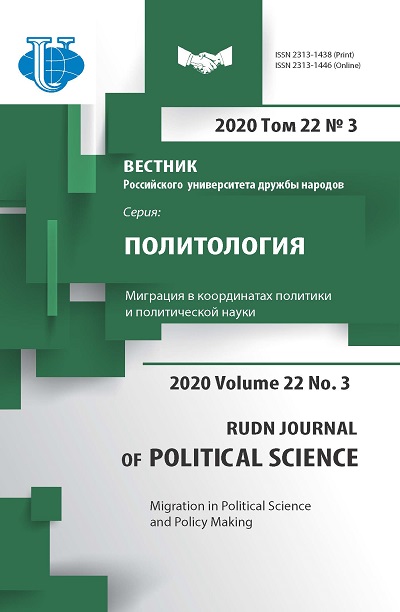«Research-policy Dialogues» in the Implementation of Migrants’ Integration Policy: Structure and Models in Russia
- Authors: Edinova M.S.1
-
Affiliations:
- Saint-Petersburg State University
- Issue: Vol 22, No 3 (2020)
- Pages: 428-442
- Section: MIGRATION PROCESSES AND INTEGRATION OF MIGRANTS IN RUSSIA
- URL: https://journals.rudn.ru/political-science/article/view/24282
- DOI: https://doi.org/10.22363/2313-1438-2020-22-3-428-442
Cite item
Full Text
Abstract
In this article, the author analyzes the structure and models of research-policy dialogues and identifies the conceptual emphasis of these interactions in the decision-making process in the scope of migrants’ integration policy in the Russian Federation. State authorities at all levels are making significant efforts to develop research and knowledge accumulation. Research-policy dialogues are important for the effective and the efficient development of migrants’ integration policy. The relevance of research-policy dialogues is determined by the need to use knowledge for various purposes by the state authorities: to provide a conceptual basis for political decisions in the field of migration policy, to develop tools and indexes for measuring integration policy, or to monitor and to evaluate the implemented policy. The author of the article analyzed the institutional forms of the research-policy dialogues in the field of migrant integration policy in the Russian Federation, studied communication channels in the framework of the St. Petersburg International Labor Forum (2018-2020), and analyzed the knowledge production process in this case using the network approach. The author considered the main research topics in the field of migration policy based on the data from the Unified Information System of Government Procurement (2016-2020), which allowed studying the functions of knowledge and the directions of its use. The author of the article concluded that the request for the mutual learning model of research-policy dialogues is just beginning to emerge in the Russian Federation. The most frequent models of dialogues are bureaucratic and consultancy, which require the use of knowledge in order to ensure legitimizing and substantiating functions.
About the authors
Maria S. Edinova
Saint-Petersburg State University
Author for correspondence.
Email: edinovams@gmail.com
Post-Graduate Student of the Department of Ethnic Politics
7/9 Universitetskaya emb., Saint-Petersburg, 199034, Russian FederationReferences
- Scholten P. Framing immigrant integration: Dutch research-policy dialogues in comparative perspective. Amsterdam: Amsterdam University Press; 2011.
- Scholten P., Verbeek S. Politicization and Expertise: Changing Research-Policy Dialogues on Migrant Integration in Europe. Science and Public Policy. 2014. 42 (2): 188–200.
- Scholten P., Entzinger H., Penninx R., Verbeek S., editors. Integrating Immigrants in Europe Research-Policy Dialogues. IMISCOE Research Series, Springer; 2015.
- Florence E., Martiniello M. The links between academic research and public policies in the field of migration and ethnic relations: Selected national case studies – Thematic introduction. IJMS: International Journal on Multicultural Societies. 2005. 7 (1): 3–10.
- Geddes A., Scholten P. The politics of migration and immigration in Europe. 2nd edition. London: SAGE; 2016.
- Geddes A. Migration research and European integration: The construction and institutionalisation of problems of Europe. In: Bommes M., Morawska E., editors. International migration research: Constructions, omissions and promises of interdisciplinarity. Aldershot: Ashgate; 2005.
- Penninx R., Kraal K., Martiniello M., Vertovec S., editors. Citizenship in European cities. Immigrants, local politics and integration policies. Aldershot: Ashgate; 2004.
- Thränhardt D., Bommes M., editors. National paradigms of migration research. Göttingen: V&R Unipress; 2010.
- Geddes A., Brumat L., Espinoza V.M., Hadj Abdou L. The Dynamics of Regional Migration Governance. Edward Elgar Publishing; 2019.
- Volokh V.A., Dmitrieva T.N. Institutional forms of dialogue between the authorities and civil society in the context of migrants integration policy (on the example of Moscow). Theories and Problems of Political Studies. 2017. 6 (2А). (In Russ.).
- Boswell C. The political uses of expert knowledge. Immigration policy and social research. New York: Cambridge University Press; 2009.
- Slaven M., Boswell C. Why symbolise control? Irregular migration to the UK and symbolic policy-making in the 1960s. Journal of Ethnic and Migration Studies. 2019. 45 (9): 1477–1495.
- Entzinger H., Scholten P. The interplay of knowledge production and policymaking: A comparative analysis of research and policymaking on migrant integration in Germany and the Netherlands. Journal of Comparative Policy Analysis: Research and Practice. 2014. 17 (1): 60–74.
- Jørgensen M.B. What makes an expert? Doing migration research in Denmark. Identities: Global Studies in Culture and Power. 2020: 1–18.
- Schmidt G. Boundary work: investigating the expert role of Danish migration researchers. Identities: Global Studies in Culture and Power. 2020.
- Ruhs M., Tamas K., Palme J. Bridging the Gaps: Linking Research to Public Debates and Policy-Making on Migration and Integration. Oxford: Oxford University Press; 2019.
- Heckmann F., Wiest D. Research-Policy Dialogues in Germany. In: Scholten P., Entzinger H., Penninx R., Verbeek S., editors. Integrating Immigrants in Europe Research-Policy Dialogues. 2015.
- Hoppe R. Rethinking the science-policy nexus: From knowledge utilisation and science technology studies to types of boundary arrangements. Poiesis & Praxis: International Journal of Technology Assessment and Ethics of Science. 2005; 3 (3): 199–215.
- Caponio T., Hunter A., Verbeek S.R. (De)constructing expertise: Comparing knowledge utilisation in the migrant integration crisis. Journal of Comparative Policy Analysis: Research and Practice. 2015; 17 (1): 26–40.
- Denzin N.K., Lincoln Y.S. The handbook of qualitative research. 2nd edition. 2000.
- Volokh V.A. Modern science on the problems of adaptation and integration of migrants Social & labor research. 2019; 4 (37): 57–65. (In Russ.).
- Dmitrieva T.N. On the issue of creation of the complex multilevel system of adaptation and integration of foreign citizens in the Russian Federation. In: Riazantcev S.V., Rostovskaya T.K., editors. The national demographic priorities: approaches and measures of realization. Ser. Demography. Sociology. Economy. Moscow; 2019. (In Russ.).
- Achkasov V.A. Migrants in Moscow and St. Petersburg: integration opportunities and risks of discrimination. In: Omarov M.A. Migration in Russia and in modern world: problems, perspectives, decisions. 2019. (In Russ.).
















